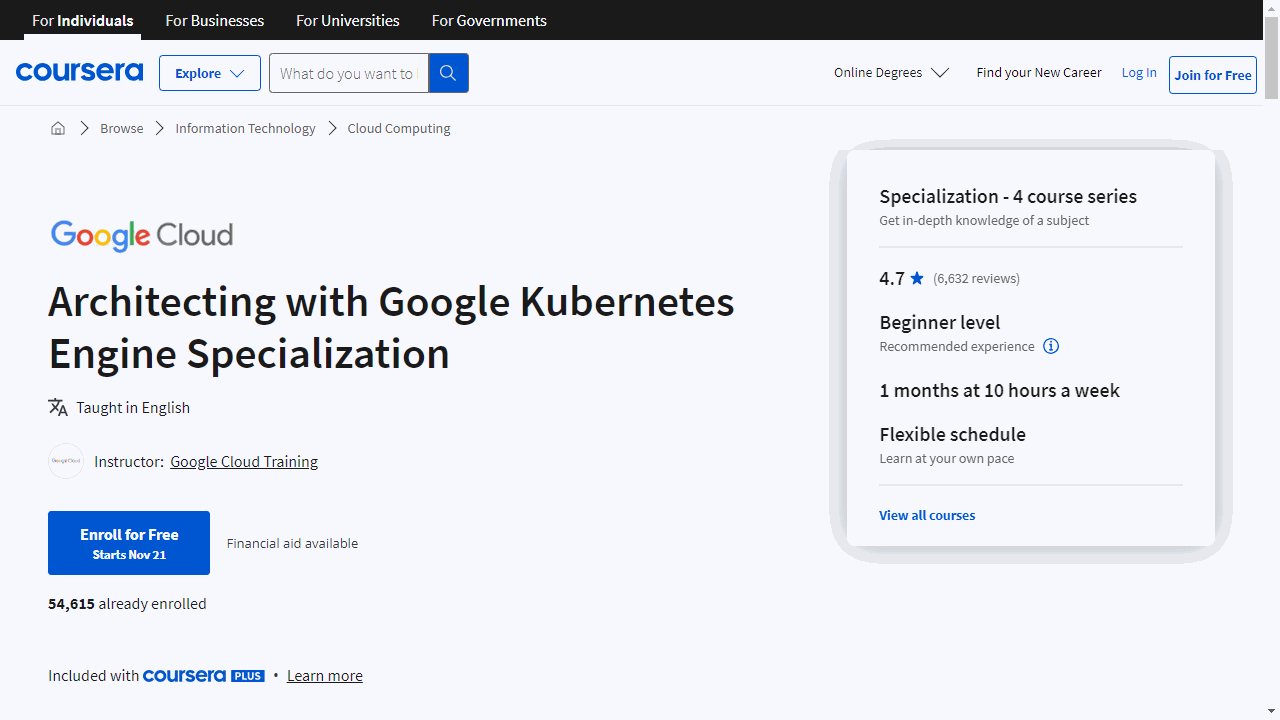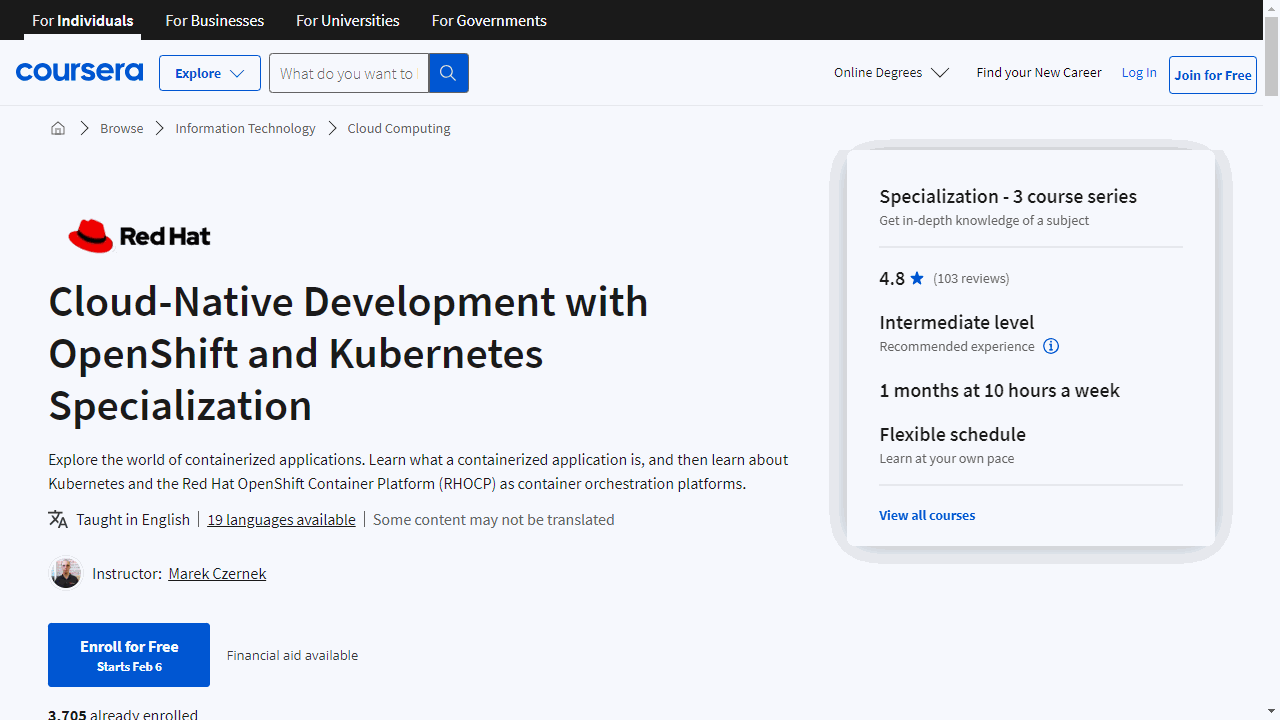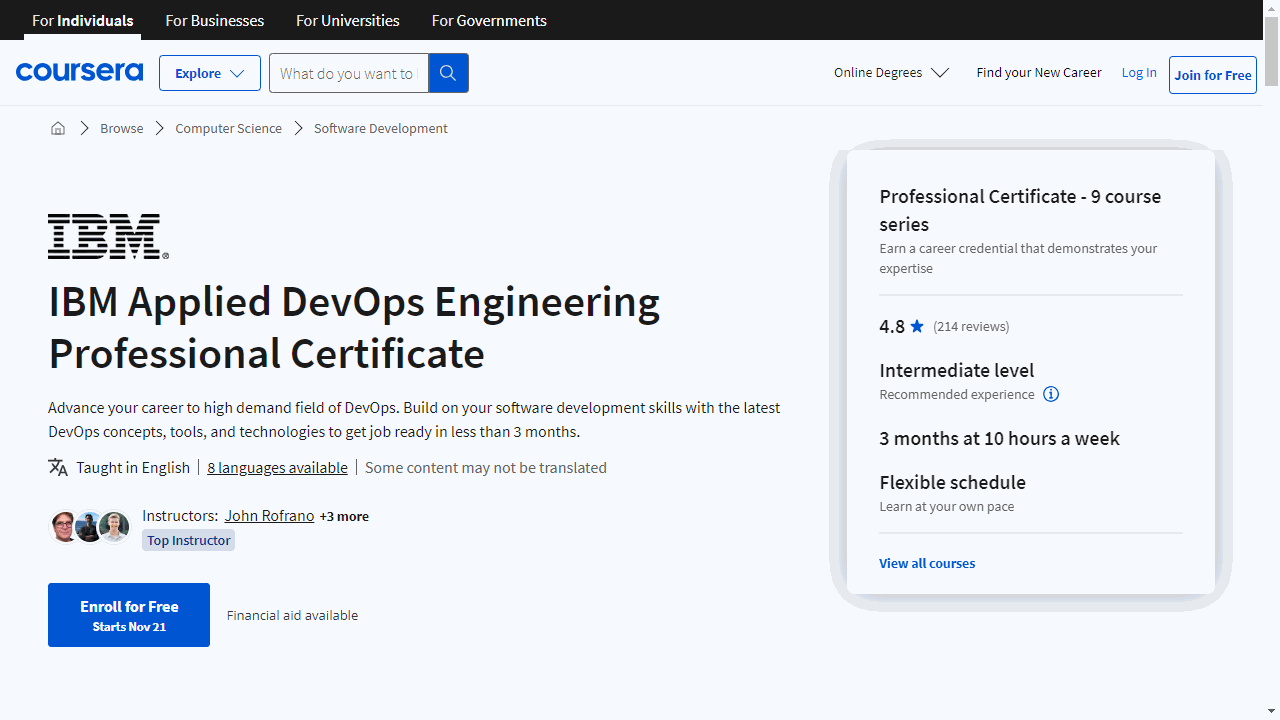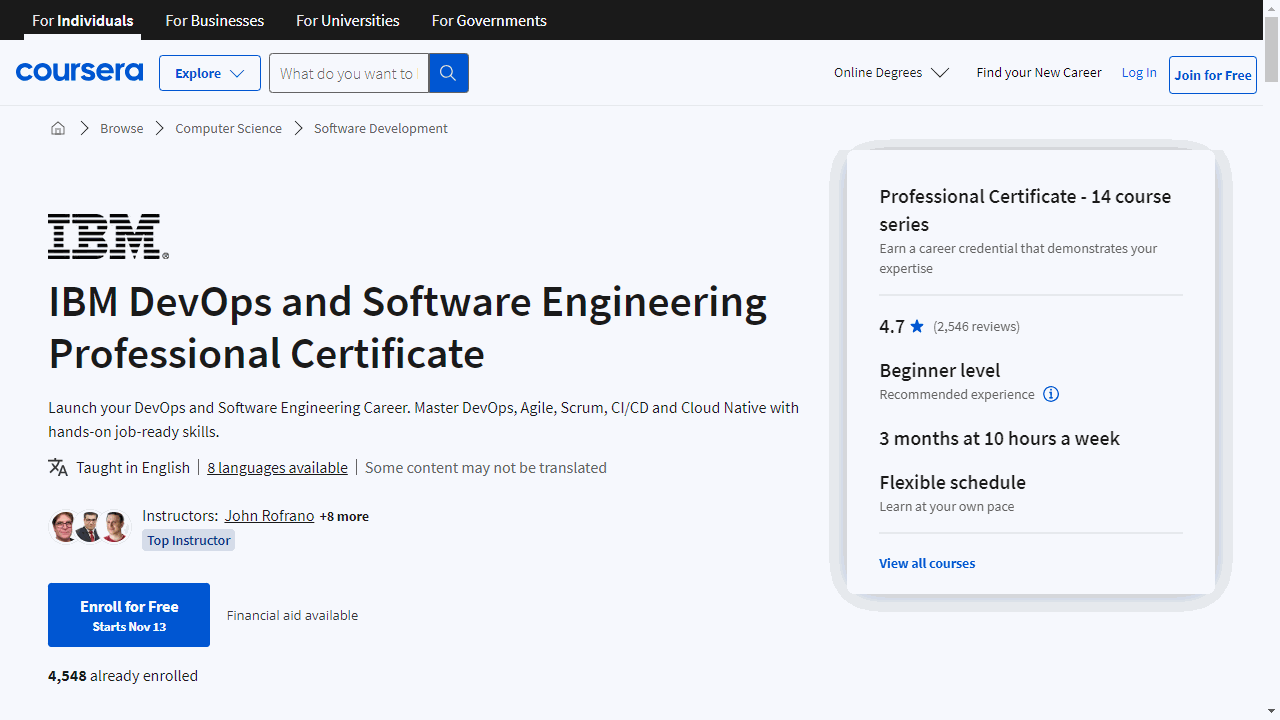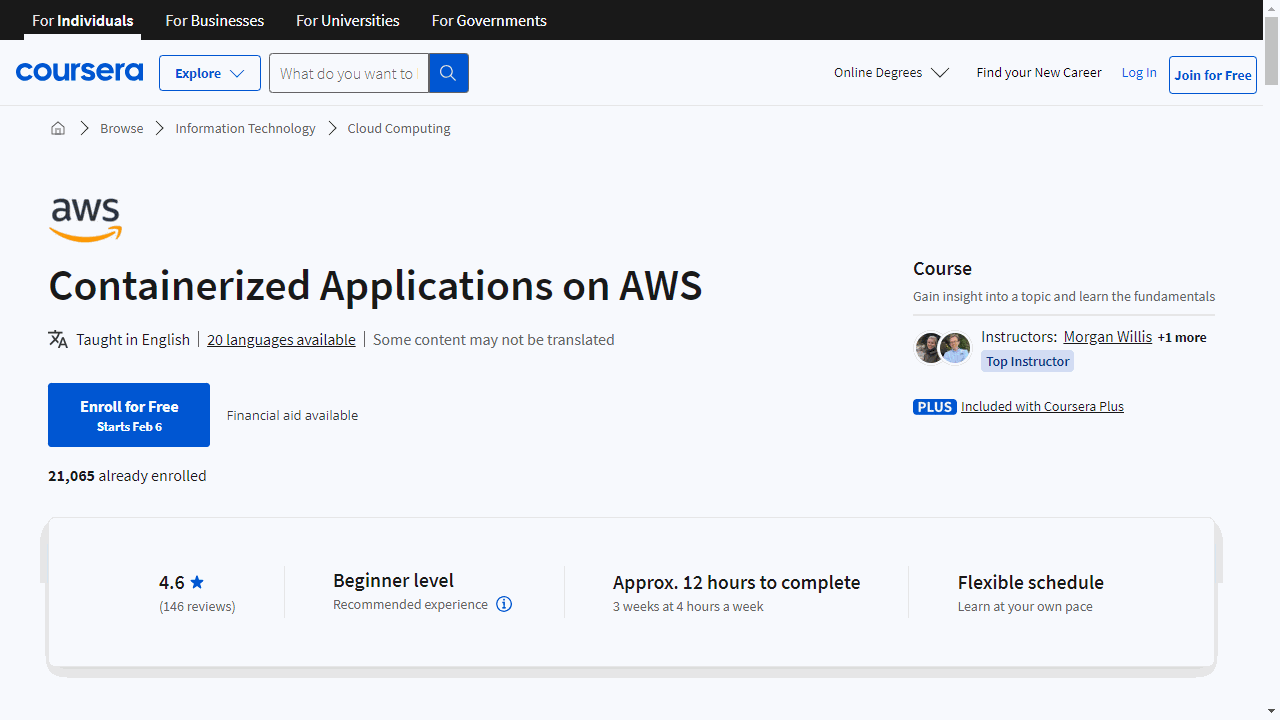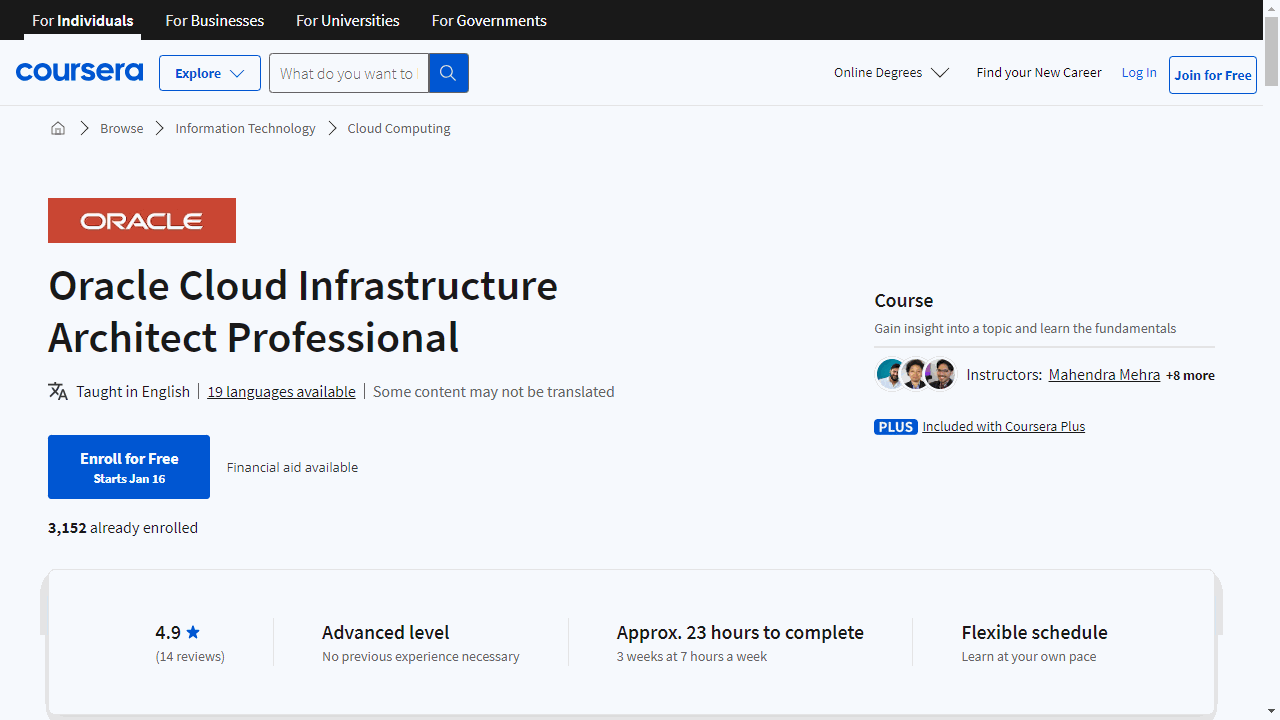Kubernetes is a powerful open-source container orchestration platform that simplifies the deployment, scaling, and management of applications in a cloud-native environment.
Mastering Kubernetes opens doors to exciting opportunities in DevOps, cloud computing, and software engineering, allowing you to build and deploy applications with greater efficiency and reliability.
If you’re looking to delve into the world of Kubernetes, finding the right course can be a daunting task.
There are so many options available, each with its own approach and focus, making it difficult to choose the best fit for your learning style and goals.
You want a course that’s comprehensive, engaging, and taught by experts, but also one that equips you with practical skills that are in high demand in today’s tech landscape.
For the best Kubernetes course overall on Coursera, we recommend "Architecting with Google Kubernetes Engine Specialization" by Google Cloud.
This specialization stands out for its comprehensive approach, covering everything from the fundamentals of Kubernetes to advanced concepts like networking, security, and monitoring.
The hands-on labs and real-world projects provide valuable experience that will prepare you for real-world deployments.
This is just one of the many fantastic Kubernetes courses available on Coursera.
Keep reading to explore our recommendations for different learning levels, specific areas of Kubernetes, and even career goals.
Architecting with Google Kubernetes Engine Specialization
Provider: Google Cloud
This series of courses is designed to incrementally build your expertise, starting with the basics and advancing to complex operations within Google Cloud with a focus on Kubernetes Engine.
The journey begins with “Google Cloud Fundamentals: Core Infrastructure,” where you’ll familiarize yourself with the core concepts and terminology of Google Cloud.
This course isn’t just theoretical; it includes hands-on labs that allow you to apply what you’ve learned by setting up and managing a basic cloud infrastructure.
You’ll also explore various storage options, tailoring your knowledge to real-world applications.
Progressing to “Architecting with Google Kubernetes Engine: Foundations,” you’ll delve into the specifics of Google Cloud’s compute services and the architecture of Kubernetes.
This course is crucial for understanding the differences between computing platforms and for learning how to manage container images effectively.
As you advance to “Architecting with Google Kubernetes Engine: Workloads,” the focus shifts to practical Kubernetes operations.
You’ll gain experience in creating and managing deployments, using GKE networking tools, and implementing persistent storage solutions.
This course is particularly valuable for those looking to manage complex workloads with precision.
The specialization culminates with “Architecting with Google Kubernetes Engine: Production,” where you’ll tackle advanced topics such as GKE security, logging, monitoring, and integrating managed storage services.
This course equips you with the skills to implement and maintain robust, secure, and efficient cloud infrastructure.
This practical approach is essential for retaining knowledge and gaining confidence in your abilities.
Cloud-Native Development with OpenShift and Kubernetes Specialization
Provider: Red Hat
Tailored for beginners and advancing to more complex concepts, this specialization equips you with the skills to manage cloud-native applications effectively.
The journey begins with “Foundations of Red Hat Cloud-native Development,” where you’ll grasp the essentials of cloud computing and Kubernetes, even if you’re starting from scratch.
This course lays the groundwork, making it easier for you to understand how to deploy and test containerized applications in a cloud environment.
Moving on, “Managing Cloud-native Applications with Kubernetes” deepens your understanding.
Here, you’ll learn to deploy applications using Kubernetes, facilitate communication between them, and manage sensitive application data securely.
This course is designed to give you practical experience, preparing you for real-world cloud-native application management.
The final course, “Advanced Application Management with Red Hat OpenShift,” takes your skills to the next level.
You’ll explore the capabilities of Red Hat OpenShift Container Platform (RHOCP), learning to deploy applications, containerize source code, scale deployments, and troubleshoot effectively.
This course is ideal if you aim to master container orchestration and manage complex applications confidently.
Throughout this specialization, you’ll acquire valuable skills in cloud platforms, applications, computing, Kubernetes, and OpenShift.
This comprehensive learning path is perfect if you’re an IT professional looking to enhance your skills or if you’re keen on entering the cloud computing field.
IBM Applied DevOps Engineering Professional Certificate
The journey begins with “Introduction to DevOps,” a course tailored for those new to the field or looking to expand their knowledge.
It covers the cultural aspects of DevOps, emphasizing collaboration and a shared sense of responsibility.
You’ll also delve into cloud-native architecture and learn about CI/CD, which are critical for creating resilient applications.
Moving on to “Introduction to Agile Development and Scrum,” you’ll immerse yourself in Agile practices and the Scrum framework.
The course is interactive, with practical labs that use real-world tools like GitHub and ZenHub.
You’ll learn to craft user stories, manage sprints, and use kanban boards, all within the context of a collaborative team environment.
In “Introduction to Containers w/ Docker, Kubernetes & OpenShift,” you’ll gain skills in containerization—a must-have in today’s software development landscape.
The course offers hands-on labs where you’ll work with Docker and Kubernetes, and by the end, you’ll be equipped to deploy and manage containers in the cloud using OpenShift.
The “Application Development using Microservices and Serverless” course introduces you to the modern approach of building applications.
You’ll create microservices and explore serverless computing, culminating in a project where you deploy an application to the cloud, giving you practical experience with the technologies.
For those interested in quality assurance, “Introduction to Test and Behavior Driven Development” focuses on automated testing techniques like TDD and BDD.
You’ll learn how to write tests that ensure your code functions correctly, an essential skill for any developer aiming to produce reliable software.
The “Continuous Integration and Continuous Delivery (CI/CD)” course teaches you how to automate software development processes to improve efficiency and reduce errors.
You’ll get to know CI/CD tools and create pipelines that streamline the path from code changes to production deployment.
Security is a critical concern, and “Application Security for Developers and DevOps Professionals” addresses this by teaching you how to identify vulnerabilities and secure your applications.
You’ll explore security practices and tools that help maintain a secure development environment.
“Monitoring and Observability for Development and DevOps” ensures you can keep your applications performing optimally.
You’ll learn about monitoring tools and observability principles, gaining the skills to troubleshoot and optimize software performance.
The capstone of the certificate is the “DevOps Capstone Project,” where you’ll apply everything you’ve learned.
You’ll take a project from conception to deployment, demonstrating your ability to develop, test, and maintain a cloud-based application.
You’ll learn from IBM’s industry experts and gain hands-on experience with the tools and practices used by professionals today.
IBM DevOps and Software Engineering Professional Certificate
Provider: IBM
This program is tailored to provide a well-rounded education, from the fundamentals of DevOps to the intricacies of cloud computing and beyond.
The “Introduction to DevOps” course is where you’ll start, gaining insight into the collaborative culture that drives high-performing teams.
You’ll explore essential practices like CI/CD and get a taste of cloud native architecture, setting a strong foundation for building robust applications.
Cloud computing is no longer just a buzzword, and the “Introduction to Cloud Computing” course ensures you understand why.
It covers everything from service models to the architecture of the cloud, preparing you to deploy applications with confidence.
The hands-on project at the end is a practical way to apply what you’ve learned.
Agile and Scrum methodologies are at the heart of modern software development, and “Introduction to Agile Development and Scrum” will help you master these approaches.
You’ll learn to plan sprints, manage backlogs, and improve team efficiency, all while fostering a collaborative environment.
If you enjoy the technical side, “Hands-on Introduction to Linux Commands and Shell Scripting” offers a deep dive into the Linux operating system.
You’ll learn to navigate the terminal and write scripts that automate tasks, skills that are invaluable in today’s tech landscape.
Version control is essential, and “Getting Started with Git and GitHub” demystifies this process.
You’ll learn how to manage code changes and collaborate effectively using GitHub, a skill that’s critical for any software engineering role.
Python is a versatile language, and “Python for Data Science, AI & Development” introduces you to its potential. Whether you’re interested in data analysis, AI, or general development, this course provides the tools to start coding with Python.
The “Developing AI Applications with Python and Flask” course allows you to apply your Python skills to the exciting world of AI.
You’ll build web applications using Flask and integrate AI features, preparing you for the future of software development.
Containerization is changing the deployment landscape, and “Introduction to Containers w/ Docker, Kubernetes & OpenShift” ensures you’re up to speed.
You’ll learn how to use these tools to create flexible, scalable applications—a skill that’s increasingly important in the industry.
Microservices and serverless architectures are modern approaches to building applications, and “Application Development using Microservices and Serverless” guides you through these concepts.
You’ll learn to develop and deploy applications in a way that’s both efficient and scalable.
Testing is crucial, and “Introduction to Test and Behavior Driven Development” focuses on ensuring your code works as intended.
You’ll practice writing tests that keep your development process on track and your end product reliable.
Automation is a key component of DevOps, and “Continuous Integration and Continuous Delivery (CI/CD)” teaches you how to streamline the software delivery process.
You’ll explore tools and practices that make releasing software faster and more reliable.
Security is non-negotiable, and “Application Security for Developers and DevOps Professionals” equips you with the knowledge to safeguard your applications.
You’ll delve into security best practices and learn how to integrate security measures throughout the development lifecycle.
Lastly, “Monitoring and Observability for Development and DevOps” teaches you how to keep your applications running smoothly.
You’ll get hands-on with monitoring tools and learn the principles of observability, ensuring you can maintain and improve your systems effectively.
The capstone project is where everything comes together.
You’ll apply all the skills you’ve acquired to develop and deploy a real-world application, demonstrating your readiness for a career in DevOps and software engineering.
This certificate program is comprehensive, offering a blend of theoretical knowledge and practical experience.
It’s designed to prepare you for a variety of roles in the tech industry, making it a smart investment for your future.
Containerized Applications on AWS
Provider: Amazon Web Services
This course is ideal if you aim to master both the fundamentals and advanced aspects of Docker, Kubernetes, and AWS-specific container services.
The journey begins in the first week with an introduction to containers, where you’ll grasp the basics of what containers are and how they operate, using Docker as the foundational tool.
You’ll quickly move from theory to practice, creating your first container and exploring AWS tools like Amazon Elastic Container Registry and AWS App Runner through hands-on exercises.
Week two escalates to microservices, multi-container deployments, and the intricacies of container orchestration.
Here, Docker Compose, Amazon Elastic Container Service (ECS), and AWS Fargate are your key learning areas.
The course ensures you understand how to deploy, manage, and scale containers effectively on AWS, blending conceptual overviews with practical exercises.
The third week is dedicated to Kubernetes, addressing your specific interest in this area.
It covers essential Kubernetes concepts, including scaling and service discovery, and introduces Amazon Elastic Kubernetes Service (EKS).
Through demonstrations and an exercise on Amazon EKS, you’ll gain valuable insights into integrating Kubernetes within the AWS ecosystem.
In the final week, the course broadens your perspective to include Amazon ECS Anywhere, Amazon EKS Anywhere, container monitoring, and leveraging container images with AWS Lambda.
An introduction to AWS App Mesh further enriches your understanding of service mesh technologies.
The course concludes with a practical exercise on running containers in AWS Lambda, ensuring a well-rounded mastery of AWS containerization.
Throughout the course, targeted readings, FAQs, and exercises reinforce your learning, making complex concepts accessible.
This structured approach, combined with direct engagement with AWS technologies, equips you with the skills to deploy and manage containerized applications confidently on AWS.
Oracle Cloud Infrastructure Architect Professional
Starting with the essentials, you’ll dive into networking architecture, where you’ll actively create and configure virtual cloud networks and load balancers.
The course emphasizes real-world application, guiding you through demos that teach you to securely connect different network tiers and manage DNS settings.
High availability and disaster recovery are next on the agenda, ensuring you can maintain operational continuity.
Through interactive workshops, you’ll gain experience with disaster recovery setups, network security groups, and even IPv6 configurations.
The course then transitions to the cutting-edge world of microservices, containerization, and Kubernetes.
You’ll get to grips with the Oracle Container Registry (OCIR) and deploy applications to the Oracle Kubernetes Engine (OKE), sharpening your skills in modern application development.
DevOps and CI/CD processes are integral to today’s IT workflows, and this course covers them extensively.
You’ll explore Oracle’s DevOps services, learn to manage serverless functions, and create API gateways, all through hands-on demos and labs.
Infrastructure as code isn’t left out, with a section dedicated to Terraform and Oracle’s Resource Manager, teaching you to automate and manage your cloud infrastructure efficiently.
Database management is a core focus, with in-depth coverage of Oracle Cloud Infrastructure Database (DBCS) and Exadata services.
You’ll learn about provisioning, cloning, backup, and recovery, with a special emphasis on the Autonomous Database (ADB) and its security features.
For hybrid cloud enthusiasts, the course includes practical lessons on the Oracle Cloud VMware Solution (OCVS) and strategies for integrating Oracle Cloud with Azure.
You’ll also tackle data migration, learning the best practices for moving data to Oracle Cloud.
As you approach the end of the course, you’ll be fully prepared for the Oracle Cloud Infrastructure Architect Professional certification exam, with insights into exam strategies and a walkthrough of the exam day process.
Throughout the course, you’ll engage with labs that build your expertise in areas like Docker image management, web application deployment, and private DNS zone configuration.
Also check our posts on:
